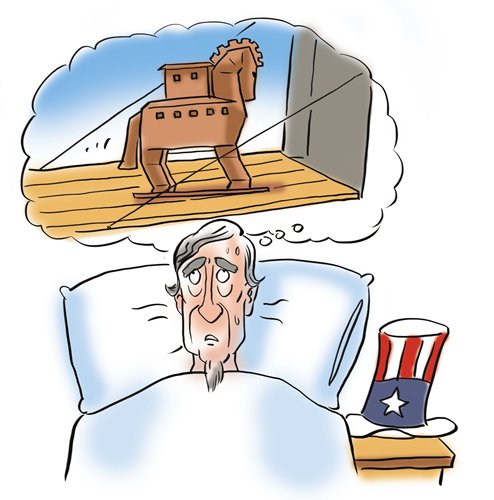
The Donald Trump administration will
probably announce trade sanctions on China soon, including additional special
tariff on steel and photovoltaic cell panels. Late last year, the White House
issued the first National Security Strategy since Trump's inauguration, with
some provisions indicating that the US will slap a slew of tough measures on
China.
Considering US midterm elections in November this year, China will inevitably
play the role of a scapegoat in many aspects. All this portends a gloomy future
for Sino-US relations.
This pessimism pervaded US society before Trump took office. In January 2017,
he used bitter rhetoric against China, making it hard to believe that ties with
Washington would be basically stable over the past year.
In April, Xi Jinping, Chinese president, and Trump co-established four
high-level dialogue mechanisms during their first meeting at Trump's Mar-a-Lago
estate in Florida. Trump also appreciated on several occasions his personal
friendship with Xi.
Strategic communication between heads of state is crucial to stabilizing Sino-US
ties. A trade war has not been launched, and the two have demonstrated
close coordination, more intimate than ever in history, in mitigating spiraling
tensions on the Korean Peninsula.
Trump paid a "state visit-plus" to China in November and the two
sides agreed to more than $250 billion in deals. China has ordered massive oil
and natural gas from Alaska while US companies are ramping up exports of
advanced technologies and equipment to China.
A report released by the US-China Business Council last month revealed that most US firms in China were seeing sales improve and enjoying better
profitability. China is further loosening market access to its finance
industry, with banking, securities and funds, insurance sectors included,
providing new opportunities for US companies.
In addition, the General Electric (GE) Energy Financial Services and China's Silk
Road Fund clinched a deal to set up an energy infrastructure
investment platform in Beijing. The Honeywell conglomerate has provided
technologies for China's oil pipeline construction project in Central Asian
countries. An increasing number of US enterprises are showing interest in the Belt
and Road initiative proposed by China.
Beijing and Washington also did a good job in managing their disputes on the
Taiwan question and the South China Sea issue over the past year. The Trump
administration reiterated that there is no change in the US' one-China policy.
China and ASEANmembers got substantial results in holding
negotiations on the Code of Conduct in the South China Sea. Though the US
military is still engaged in the South China Sea, China has adopted a rather
restrained attitude.
However, all these positive developments will probably take a dramatic turn in
2018. What is most worrying is that the US strategic circle seems to wrap up
the mass debate on China policy since 2015. Getting tougher on Beijing may well
become a new trend in its political realm. The Trump government called China a
rival power, so "competition" will dominate its China policy.
Consequently, China will likely fall victim to vehement US political strife. No
one wants to be perceived as being weak on China.
In the economic arena, radical politicians led by US Trade Representative
Robert Lighthizer have growing influence. Congressmen would like to see a
strengthened role of the Committee on Foreign Investment in the United States
so that it can further check direct investment from Chinese enterprises.
Chinese students majoring in science, engineering and the like will also suffer
as their visas are to be restricted.
Although people are expecting the PyeongChang Winter Olympic Games to help ease
tensions on the Korean Peninsula, the Trump government will, in any way, take
unilateral action to launch military strikes on the North if Pyongyang
continues nuclear and missile tests.
If US warships dock by Taiwan, it will touch Beijing's bottom line and trigger
a military conflict. The Trump administration will likely provide more advanced
weapons to Taiwan to counter Beijing. Though the White House attaches more
importance to trade, the Pentagon is increasingly concerned about the changing
dynamics in the China-US military balance in the West Pacific and especially
the South China Sea.
The Trump government sees Beijing and Washington as rivals, which however is an
acknowledgment of a more powerful and influential China. There's no doubt that
competition and confrontation are different conceptions and few countries can
reap benefits from a hostile Sino-US relationship. In particular, if there is a
trade war between the two, it will snuff out the momentum of global economic
recovery.
The year 2018 is the 40th anniversary of China's reform and opening-up. Over
the past four decades, drastic changes have taken place across China and
Sino-US ties have undergone progress amid twists and turns. China will further
its reform and opening-up policy and fulfill its commitment to defending the
international order.
The Trump government must realize that it is doing many things that harm the
international order. Learning how to cooperate is nothing bad for an
increasingly lonely superpower.
The author is a senior research fellow with the Charhar Institute.
Source:Global Times,2018-1-14